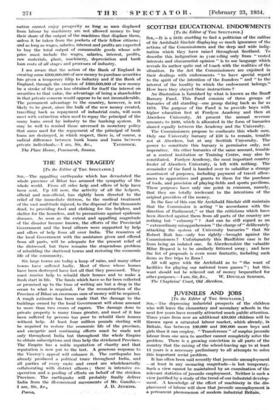MALADJUSTMENT IN INDUSTRY
[To the Editor of THE SPECTATOR.]
SIR,—The arguments in my recent letter were not based on any Wages Fund Theory, nor on any belief that the amount of wages is fixed absolutely by the amount of capital existing in a country. They were based on the fact that a
nation cannot enjoy prosperity as long as men displaced from labour by machinery are not allowed money to buy their share of the output of the machines that displace them, unless it be taken from the pockets of their fellow citizens ; and as long as wages, salaries, interest and profits are expected to buy the total output of consumable goods whose sole price must include the wages, salaries, interest, profits, raw materials, plant, machinery, depreciation and bank loan costs of all stages and processes of industry.
I am aware that the action of the Bank of England in creating some 2800,000,000 of new money to purchase securities has given a temporary fillip to industry and if the Bank of England, through the creation of £300,000,000 of new money by a stroke of the pen has obtained for itself the interest on securities to that value, the advantage of being a shareholder in that private concern would appear to be not inconsiderable. The permanent advantage to the country, however, is not likely to be great, since the bulk of the new money created, travelling back as repayment of industrial costs, will soon meet with extinction when used to repay the principal of the many loans owed by industry to the banking system. It may be well to remind those unversed in monetary policy that sums used for the repayment of the principal of bank loans are destroyed, in which respect, there is, of course, a radical difference between bank loans and loans between
private individuals.—I am, Sir, &c., TAVISTOCK. The Place House, Peastnarsh, Sussex.

















































 Previous page
Previous page